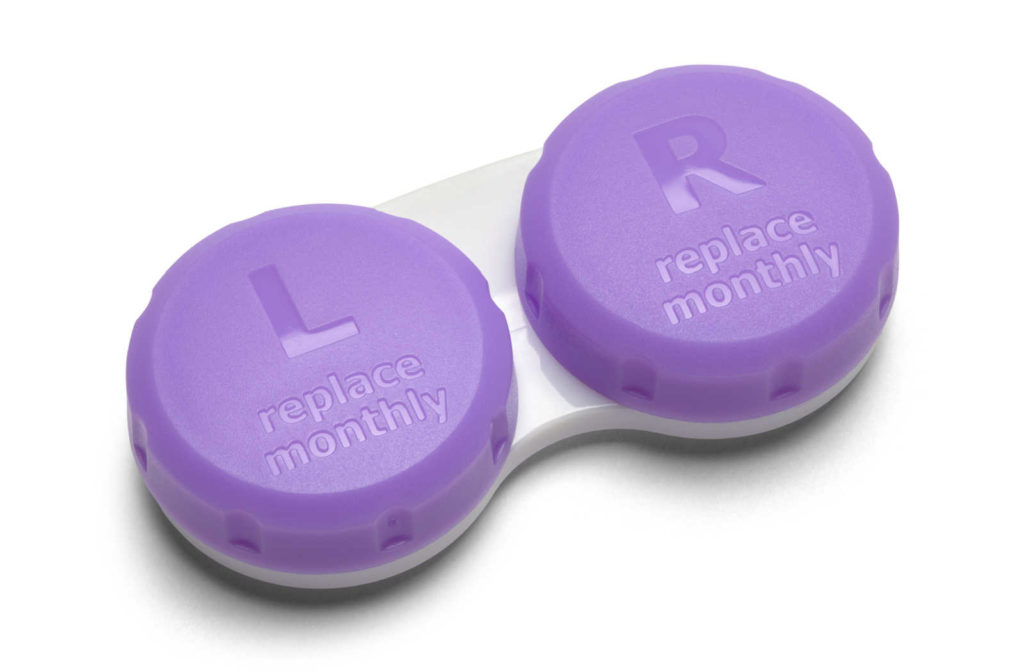Many people prefer to wear contact lenses to correct their vision problems. They’re flexible, offer a wider range of vision, and have an aesthetic appeal. During your contact lens fitting, your optometrist will explain why contact lens care is essential to keeping your eyes healthy.
If you’ve chosen to wear contact lenses but only occasionally, you’ll need to pay extra attention to how long you’ve stored your lenses in your medicine cabinet. Contact lenses can expire, and wearing them past the expiration date can harm your eyes.
Soft & Rigid-Gas Permeable Contact Lenses
The two primary types of contact lenses are soft and rigid-gas permeable (RGP) lenses.
Soft contact lenses are made from a flexible material that forms on the cornea—the surface curve of the eye—and are the most worn type of contact lens. They’re comfortable and ideal for irregular wear, making them the perfect choice if you still like wearing glasses.
They rarely fall out of the eye, making them an ideal option for sports, and they’re less susceptible to dust or other foreign particles getting under the lens.
RGP lenses are typically known as “hard” lenses. They offer crisp vision and are a good choice for those with astigmatism. They’re also durable and easy to handle, so their care is lower maintenance than soft contact lenses.
The difference in composition of these lenses affects their longevity and expiration date. Understanding the difference can save you from holding onto lenses for too long and unknowingly wearing contacts beyond their expiration.
Why Do Soft Contact Lenses Expire?
Contact lenses themselves don’t necessarily expire, however, they’re at risk for contamination. Your contact lenses come in little blister packs, sealed tight with a saline solution to keep them sterile. The plastic packets don’t last forever. After about 4 years, the seal starts to break down.
Once the seal is compromised, your contact lenses are unwearable. Once air enters the seal, bacteria can grow and form on the lens, and your eye’s surface is one of the most permeable membranes of your body, so it’s vulnerable to infection.
You should follow the expiry date set by the manufacturer. They can’t guarantee the safety of the lenses beyond that point.
Do Rigid-Gas Permeable Contact Lenses Expire?
Unlike soft contact lenses, RGP lenses don’t typically need an expiration date. RGP contact lenses fit your custom measurements and are then sent to your optometrist rather than being mass-produced. They’re designed for long-term wear and can last 2 to 3 years.
While RGP lenses will last, you should ensure your contact lens prescription doesn’t expire.
Why Do Contact Lens Prescriptions Expire?
Your eyes may feel comfortable in your contacts and assume your eyes haven’t changed, but an updated contact lens exam can detect changes in your vision you haven’t noticed.
A refreshed prescription can improve the fit and strength of your prescription, ensuring you’re not wasting money on contact lenses that aren’t optimally correcting your vision.
Visiting your optometrist for an updated prescription at least every 2 years also allows you to discuss your contact lens comfort and other eye concerns.
Is Wearing Expired Contact Lenses Dangerous?
Wearing expired contact lenses isn’t the same as eating food beyond its “best before” date. Your eye health relies on good contact lens practices, so following expiration dates is critical.
If you wear contact lenses after their expiration dates, you can be at higher risk of developing keratitis. Keratitis is an inflammation of the cornea, and microbial keratitis can occur when germs invade the cornea through improper contact lens care, wearing contacts for too long, or wearing expired lenses.
Viruses, bacteria, and fungi are the kind of germs that can invade the eyes and cause severe complications to your overall eye health.
Symptoms of an eye infection can include:
- Red eyes
- Pain around or in the eyes
- Sensitivity to light
- Sudden blurry vision
- Discharge or overwatering of the eyes
If you experience any of these symptoms or notice you accidentally wore expired contacts, schedule an eye exam for peace of mind and early detection of problems.
How to Care for Your Contact Lenses
Taking proper care of your contact lenses can help prevent bacteria from growing and irritating your eyes. Your optometrist will educate you on proper care and cleaning, but some general instructions may include the following:
- Wear your contacts only for the length of time your optometrist recommends
- Wash your hands before and after handling your contact lenses
- Don’t nap or sleep while wearing daily wear lenses
- Inspect your lenses for dust or debris
- Don’t top up the contact solution in your case; completely replace it
- Keep water away from your contact lenses
- Replace your contact case every 3 months
- Maintain your eye exam schedule
Keep Your Contact Lenses Fresh & Up to Date
If you’re unsure how long your old box of contact lenses has been collecting dust, don’t take any chances. Schedule an appointment with our team for an updated contact lens exam and prescription. We can order your new contact lenses while in the clinic to ensure you only wear sterile, new contacts for clear vision.




